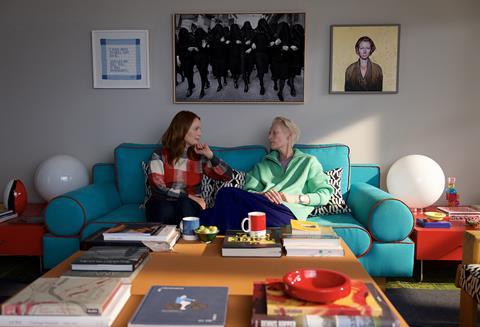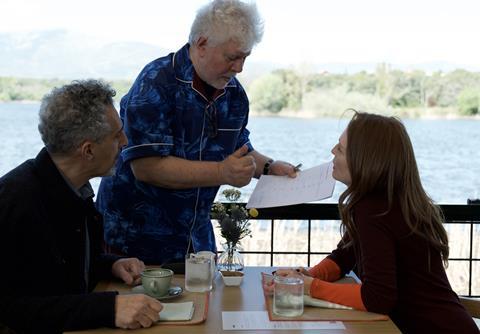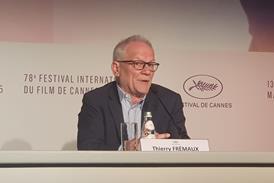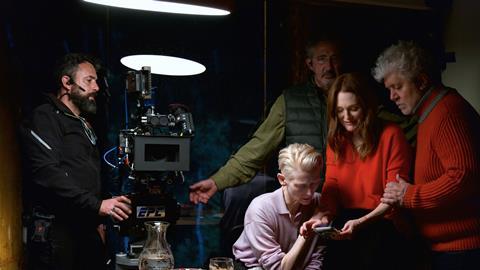Pedro Almodovar confronts issues of mortality in his first English-language feature ‘The Room Next Door’.
Venice Golden Lion winner The Room Next Door is the first of Pedro Almodovar’s features to have all of its dialogue in English but, if he had wanted, he could have made the jump more than three decades ago.
“At the end of the ’80s, after Women On The Verge Of A Nervous Breakdown [1988], Hollywood started proposing to me to make movies in English there,” he says. “But I was very clear in my mind that I didn’t want to go to Hollywood, and that I didn’t want to make a big movie with a big star and a big budget.”
Fellow directors told him horror stories about the US studio system.
“If you make a movie in Hollywood, you have to pay attention to 15 people, at least – the actors, the agents, all the studio executives – and many things interfere with the point of view of the director, and that’s very bad for a movie,” says Almodovar. “I knew if one day that I make a movie in English, it should be under my conditions.”
He admits, too, that he was daunted by the prospect of making a film that was not in his native Spanish – but that is less of an issue than it once was. Almodovar has an interpreter by his side while chatting to Screen International in a London hotel, but she is barely needed: 90% of his answers are in confident, if idiosyncratic, English.
All the same, he wrote and directed two English-language short films – The Human Voice (2020) with Tilda Swinton, and Strange Way Of Life (2023) with Pedro Pascal and Ethan Hawke – as “a kind of rehearsal for me, because I wasn’t sure”.
Once they had been released, he was ready for a feature-length film.
Leading lights

It helped that Almodovar grew close to Swinton while making The Human Voice. He was already planning to adapt Sigrid Nunez’s 2020 novel What Are You Going Through, in which a retired war correspondent with terminal cancer persuades a friend to stay with her while she prepares to die.
It struck him that “the sick person is a perfect character for Tilda, physically, and in the way I imagined the character”. The next piece of the puzzle was the casting of Julianne Moore, who plays Ingrid, a friend of the dying Martha.
He and his two leading ladies all worked together easily, he says: “It was natural. We belong to different cultures, but after the first week we understood each other very well.” And, despite the New York City and upstate setting and the English dialogue, The Room Next Door was still “a European production” – produced by his brother Agustin Almodovar and made by their company El Deseo.
It is one that earned four nominations at the European Film Awards, including for best European film. Spain ($2.5m) currently leads the charge for box office, and Sony Pictures Classics has set the North American release in late December.
The Room Next Door shot in Spain for “six or seven weeks”, and in the US for three. Most of the interior scenes were in studios in Spain, while exteriors for the upstate New York house rented by Martha, and where most of the film is set, come courtesy of brutalist showpiece Casa Szoke in El Escorial, an hour from Madrid.
The themes of The Room Next Door were close to home, too: like 2019’s Pain And Glory, the film suggests that Almodovar is thinking about mortality.
“I think a lot about that,” he agrees. “And the passing of time, basically. I am very sensitive to that – to how every day I’m older than the other day. I was raised in a Catholic place, receiving a religious education from Catholic priests, and that was the best thing to become an atheist. So [being an atheist] means I don’t have the support that the Catholic people I know in Spain have, and I feel very naked with the reality of mortality.”
Filming was a kind of therapy, he says. “Sometimes I felt we were four of us in the house in the woods – Tilda, Julianne, me, and death was there too.”
At the start of The Room Next Door, Moore’s character Ingrid is afraid of death, and upset by the feeling that anything living should die.
“This is exactly how I feel. But at the end she became a very strong woman, like a woman of the noirs, all the thrillers, and I felt much stronger too. I normalised – not completely – but I normalised death more than before.”
The film is a tender tale of acceptance and friendship, but it is also a polemic that leaves the viewer in no doubt as to Almodovar’s beliefs about ending one’s own life.

“I’m talking about human rights,” he insists. “You have the right to be the owner of your death, to pray to your ancestors and, if you have a terminal sickness, just to decide when is the day to go.”
Between this contentious plot, and the speeches that John Turturro’s character makes about the climate crisis, The Room Next Door stands as one of the more blatantly political of Almodovar’s works, alongside his previous film, 2021’s Parallel Mothers, which includes mention of the mass graves of those killed during the Spanish Civil War. Is he consciously moving in a more politically engaged direction?
“It depends on the story,” muses Almodovar. “With this story, I thought it was the right moment to be more political. With time, getting older, perhaps you become more political. But it doesn’t mean I will be making political movies from now. For example, I’m writing the next movie that will be in Spanish, and this is not so political.”
When asked for the details of that next film, Almodovar half-jokes, “My brother doesn’t like me to say.” But he goes on to reveal its main concern is the ethics of autofiction – whether it is justifiable to write a novel or a film about your own life, even if it means including intimate details of the lives of the people around you.
And beyond that? At 75, Almodovar is considerably younger than Ridley Scott (86) and Clint Eastwood (94) at the time their latest films were released, so does he hope to keep working as long as they have, despite his current preoccupation with the passing of time?
“I don’t know if I will be in such a good state like Eastwood,” he smiles. “This is incredible.”
But he is heartened by John Huston’s adaptation of James Joyce’s short story The Dead, which the two women watch together in The Room Next Door, directed by Huston shortly before his death in 1987 at the age of 81.
“I remember very well a picture of him at the moment when he was shooting. He had the mask for the oxygen and he had a drip for the liquid, and he was obviously sick but he was so happy. I identify very much with this image. I don’t mind if I am in that condition – if I feel that I have something to say, a story to tell, a new idea to develop, I would like to end like him. I want to be making movies the rest of my life.”


































No comments yet